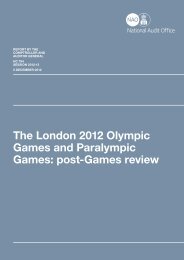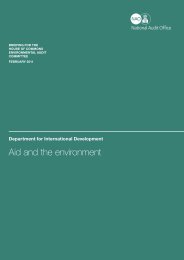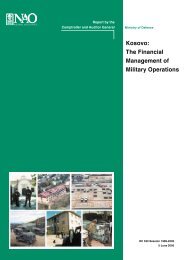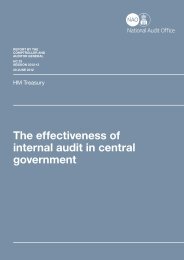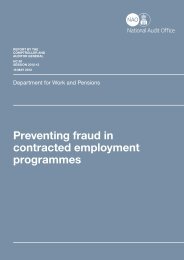Department of Health: The Paddington Health Campus Scheme
Department of Health: The Paddington Health Campus Scheme
Department of Health: The Paddington Health Campus Scheme
You also want an ePaper? Increase the reach of your titles
YUMPU automatically turns print PDFs into web optimized ePapers that Google loves.
part two2.7 After spending £1,040,000 in total with SOMon design fees for a planning application prepared inaccordance with an agreed development brief, the schemefailed to secure outline planning permission adequatefor the development. 7 Outline Planning Permissionwas agreed in principle by Westminster City Councilin August 2002, subject to the completion <strong>of</strong> a legalagreement. In the event the planning permission was notissued as the scheme had moved on.2.8 In the negotiations with the <strong>Campus</strong> partners on theAugust 2002 scheme, Westminster City Council’s planningdepartment had stressed the maximum bulk and scalethat could be recommended for the site and thereforebelieved the partners to be aware <strong>of</strong> its planning concernsbefore November 2002. In November 2002 the Council’splanners advised that the scheme, which was by thensignificantly different from the August 2002 scheme, wastoo large for the existing site (by one floor for St Mary’sand two floors for the Royal Brompton and Harefield’sproposed buildings). This required the partners to acquireadditional land to address the building design issues.2.9 Procurement <strong>of</strong> a major capital investment <strong>of</strong> thescale <strong>of</strong> the <strong>Campus</strong> scheme is a one-<strong>of</strong>f event and fewif any NHS Trusts or Boards have the necessary skills forsuch a scheme. In November 2002, the <strong>Campus</strong> partnersappointed Partnerships UK (PUK) as a procurementco-sponsor for the scheme (backdated to 1 July 2002).St Mary’s NHS Trust told us that <strong>Campus</strong> partners assumedthat with the degree <strong>of</strong> expertise that PUK brought,they had the best available advice on the management<strong>of</strong> complex PFI projects in the NHS. This included theprocurement <strong>of</strong> advisers and property advice.2.10 PUK’s role was to work with the <strong>Campus</strong> partners toachieve the successful procurement <strong>of</strong> a contract for thescheme in a timely and efficient manner. PUK also agreedto fund 50 per cent <strong>of</strong> internal and third party projectdevelopment costs up to a maximum <strong>of</strong> £6 million andshare any value for money savings from a signed contract.2.11 If the scheme was cancelled by the <strong>Campus</strong> partnersPUK would recover its direct costs and project funding.Once the scheme was cancelled, when the Royal Bromptonand Harefield NHS Trust did not recommend the May 2005Addendum to the OBC for approval, PUK was thereforeentitled to recover its investment. In October 2005 theTrusts agreed to settle the amount due to PUK whichrepresented £1.1 million in direct costs, £4.8 million forthird party and internal project development costs fundedby PUK and £0.1 million in interest charges for deferredpayment. <strong>The</strong> NHS Trusts agreed to pay these amounts,in broadly equal proportions in April 2006, because <strong>of</strong>cash-flow problems in the NHS in the North West LondonStrategic <strong>Health</strong> Authority. <strong>The</strong> Strategic <strong>Health</strong> Authorityhas agreed to reimburse the two Trusts £1 million eachtowards the settlement <strong>of</strong> the sums due to PUK.Organisational risk2.12 This refers to the additional risks introduced tothe successful delivery <strong>of</strong> the project by the <strong>Campus</strong>partners themselves. <strong>The</strong>y include project sponsorship;risk management; project management; and clinical andpublic support.Project sponsor2.13 A key risk in this area was the decision <strong>of</strong> the twoNHS Trusts to enter the <strong>Campus</strong> scheme as separate, ratherthan merged, organisations. This prevented the schemehaving a single management chain capable <strong>of</strong> actingquickly and decisively on the areas within its control andassessing risks on a consistent basis. <strong>The</strong> Royal Bromptonand Harefield NHS Trust Board had formally identified aTrust merger as an unacceptable option and a conditionwhose breach would remove its support for the <strong>Campus</strong>scheme. <strong>The</strong> concern was that a corporate merger,undertaken for mainly project reasons, might makethe delivery <strong>of</strong> the campus easier, but that the resultingmerged hospital would so change the nature <strong>of</strong> theservices it was able to deliver that a primary purpose <strong>of</strong>improved specialist services would have been jeopardised.<strong>The</strong> <strong>Department</strong> believed a merger was desirable but didnot propose one at the start <strong>of</strong> the scheme as it believedsuch a requirement would stop the scheme.7 Initial payments were made by Kensington, Chelsea and Westminster <strong>Health</strong> Authority on behalf <strong>of</strong> the West London Partnership Forum until October 2000,after which St Mary’s NHS Trust hosted payments in accordance with its Standing Financial Instructions. Kensington, Chelsea and Westminster <strong>Health</strong> Authoritywaived its Standing Financial Instructions to take account <strong>of</strong> the increased cost as the <strong>Paddington</strong> Basin Steering Group judged the time required to tender thework would have delayed the planning application unacceptably. <strong>The</strong> only other material breach <strong>of</strong> procurement guidelines was the contract with Mike FlaxmanAssociates, let in 2000 on the basis <strong>of</strong> a cost estimated by the <strong>Campus</strong> partners at £75,000 for consultancy on NHS financial matters. <strong>The</strong> work was not tendereduntil 2002 by which time Mike Flaxman Associates had been paid £173,000. In total they were paid £460,000 between March 2000 and June 2005.<strong>The</strong> <strong>Paddington</strong> <strong>Health</strong> <strong>Campus</strong> scheme17



